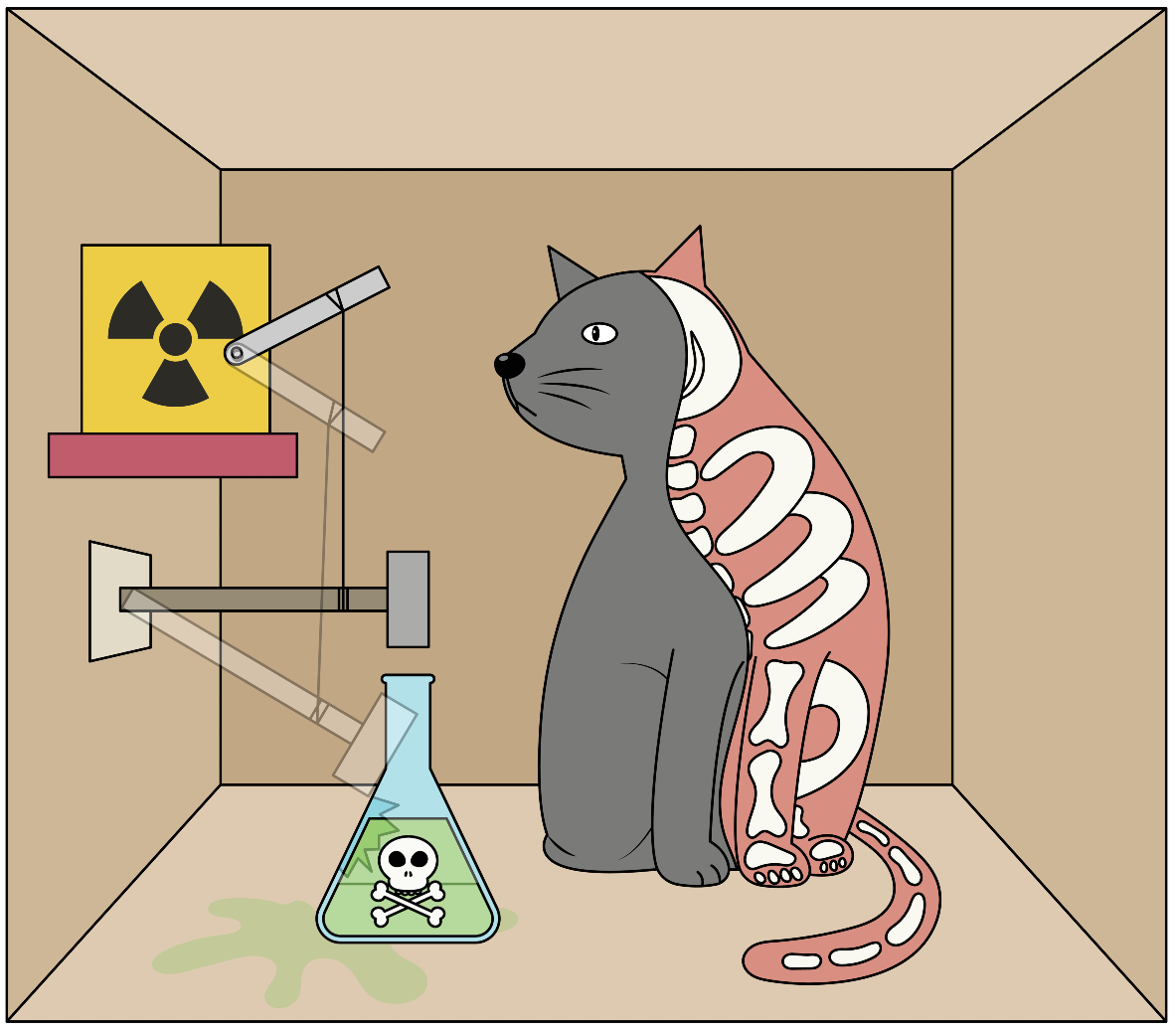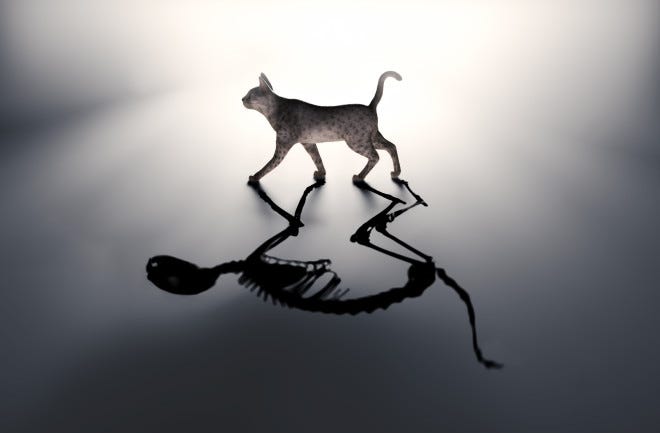Between Waking And Dreaming

Welook down on the superstitions of the past, and ignore the superpositions of the present. Modern living means holding many contradictory positions at once. Violence is bad, unless it’s in the movies, in which cases it’s great. Celebrities are madonnas in Vogue and whores in the tabloids. We’re both empowered citizens who must have an opinion about everything, and powerless plebes who can’t do anything.
DOUBLETHINK means the power of holding two contradictory beliefs in one’s mind simultaneously, and accepting both of them — George Orwell
I say superposition because of the idea of quantum superposition. An effective religious belief based on how much any of us understand it, metaphorically mangled for whatever position we want to. In the vague quantum sense it means you don’t know a particle’s position until you observe it, like a cockroach it’s fucking everywhere until you flick on the lights. In the classic thought experiment, Schrödinger’s cat is both dead and alive if you keep it in the same box as a (potentially) deadly subatomic event.
Such is the state of the modern mind, by turns bloodthirsty and bloodless depending on when you ask. In the darkness of the movie theatre, we cheer for violence, for running from the cops, and taking justice into our own hands. Then we abhor the same behavior as terrorism or insurrection if we see it on the news. We form this distinction as easily as we do between the world of dreaming and waking and it is, indeed, the same thing.
The curious thing about dreaming is that we generally don’t know that it’s not real. It’s absurd and nothing makes sense, but it’s fully rendered enough and we’re generally bamboozled every night. We never consider that we might also be bamboozled during the day. As Zhuangzi famously said in his parable of the butterfly:
“Once Zhuang Zhou dreamt he was a butterfly, fluttering about joyfully just as a butterfly would. He followed his whims exactly as he liked and knew nothing about Zhuang Zhou. Suddenly he awoke, and there he was, the startled Zhuang Zhou in the flesh. He did not know if Zhou had been dreaming he was a butterfly, or if a butterfly was now dreaming it was Zhou.”
The fact is that we use the same wet matter to render both dream and reality. They both run on the same hardware. It’s like using your phone to watch a movie or to make a movie. The ultimate experience is still the same pixels on a screen. So equally it is with synapses in the brain. We don’t know we’re dreaming because we’re running a highly convincing virtual reality simulator between our ears. We also generally don’t know that we’re just simulating reality when we wake up.
The fact is that there are no set colors or sounds or experiences in the world, per se. Other creatures experience different colors and sensations entirely, or don’t experience the same ones at all. To take just vision, we render image through rods and cones on our retina like the sensor on a camera. The image we process of reality is actually on a time-delay, reality often happens much faster than we can even process.
We all actually live in a simulation, rendered within our individual brains. The simulation seems (and I suppose is) more real than dreaming because it has consequences, and those consequences persist. If you prick me I, I do bleed, and if you skewer me enough I do die. The entire point of the simulation is to keep itself running long enough to reproduce, and to literally regenerate the world anew in little simulators running around.
What takes our simulation from the more scientific mind of a light-seeking phytoplankton to the more dramatic mind of a human is the fact that we don’t think, or even really exist, in isolation. A human being kept in isolation—as so many are in the torture chambers called jail—rapidly begins to go insane. We start generating voices and delusions, to compensate for the inputs our simulator actually requires to function. The waking state becomes a dream or, more accurately, a nightmare.
Human brains are really a network a vast Internet of social animals, using language and music and art to generate an entire superstructure of meaning and reality which is ephemeral as dreams across the aeons, and yet as deadly as the jungle in the moment. The entire world of the art and the artificial is dreams made real, the simulator running on steel and silicon.
Like our own minds, these social simulations have equal claim on ‘existence’ and indeed corporations already have political status and power as ‘legal persons’, a concept well-established and generally ignored for centuries. Our waking delusion is that we dream alone when in fact we dream together. Our hubris is that we command our dreams, when they have already started dominating us in the form of Capital incarnate. As Marx said, “Just as man is governed, in religion, by the products of his own brain, so, in capitalist production, he is governed by the products of his own hand.”
We live in an artificial world with real consequences. A social dream made real, a reality often made a nightmare. We drown for lack of paperwork as much as for lack of air. We sit comfortably because of commas in a bank account, as real as if they were a chair. Modern life is as full of contradictions and inanities as a dream. Indeed, human life is a dream, one we loosely share.
Just as we easily flip between contradictions and end up in weird places in dreams, we do the same in this shared hallucination we call life. Violence is brave and bold on one screen and dismal and dire on another. Sex is hot and wild on one tab and dirty and disgusting on another. Calling these contradictions is just another tactic, not truth in itself. The ‘truth’ is that every attempt at meaning is actually a manipulation of reality, trying to hold it down for a second so you can grab that food, hit that enemy, and survive to dream another day.
I don’t know how I got here or where this ends, but it’s just a thought I had walking through the country with a friend. It seems like a dream now, the way I selectively reconstruct it in my mind, flitting from scene to scene, honestly making stuff up as I go along more than recalling anything that ‘actually’ happened.
I mused that the ancients probably didn’t have this clear distinction between waking and dreaming, between drama and life. To them the gods would have been as real as the people we see on TV and ‘The Economy’ we’re supposed to sacrifice our lives for. Who are we to say we’re better or smarter or more ‘realistic’ than them? Because we have more stuff? Doesn’t that stuff seem to have us? That we understand the science behind the weather and know that it’s not gods flinging thunderbolts? But then we used that science to make the weather completely shit. What was the fucking point?

If the point of simulating reality is to survive better then we’ve completely missed the point. The truth is that we, who defy the idea that the gods dreamed the world into existence, who claimed that power for ourselves, have now ended up bit characters in the dream of Capital, the artificial lifeform that chewed over the globe for centuries and whose emissions are now choking out 99% of all previous lifeforms, including many of us.
We talk about AI as something in the future, but it’s already here, the globe-spanning consciousness we call ‘The Economy’, that creation of our own dream world, now bringing an entirely new geological reality to life. The simulation has become the simulator. The dream itself has awoken. The dead has come alive.